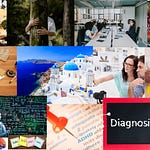The significant contributions of talented neurodiverse individuals and their vital role as leaders in both the development and ethical use of AI for the betterment of all humanity are acknowledged. Several innovative applications are discussed that have the potential to benefit us all, particularly the neurodiverse community and individuals with visual-spatial memory challenges.
A video interview with Derek Crager, founder of Practical AI1 and an enlightened AI scientist and developer, is particularly relevant today, during a time of concern about AI’s rapid growth, finding its most beneficial applications, and potential misuses.
Below is the edited podcast transcript:2
Ron:
Welcome to Mind Wise, a video podcast and newsletter that embodies holistic mental health, healthcare, wellness, perspective, and information. I am your host, Ron Parks, an MD, a writer, teacher, and consultant. Today, I’m excited to introduce our video podcast guest, Derek Crager, founder of Practical AI.3 He has created a vibrant community for neurodiverse individuals to harness AI and build skills, making AI more accessible while also helping them increase their income at no cost. Diagnosed with autism spectrum disorder, dyslexia, and ADHD himself, he has firsthand experienced the transformative power of embracing these identities.
This resonates with my son Shan and me. Shan is a talented tech enthusiast, writer, editor, and my favorite collaborator; he’s currently in the background in case Derek or I make a mistake or press the wrong button.
Highlights of Derek’s career include developing one of Amazon’s highest-rated training programs, which showcases the potential of AI and illustrates how thoughtful understanding, combined with the right tools, can unlock its power and benefits. He found that a recent article and podcast by me, ADHD: A misdiagnosis or a lost opportunity for the best treatment resonated with him.4 The presentation discussed the challenges surrounding ADHD (attention deficit hyperactivity disorder), DVSD (developmental visual spatial difficulties), and ASD (autism spectrum disorder) diagnoses, along with the potential pitfalls of these labels. All of this resonated with him, reminding him of his own deeply intertwined journey with these themes and the mission behind his work—something he is profoundly passionate about, just as Shan and I are.
Since our time is limited today, we’ll save Shan’s sharing and comments for another occasion. Go ahead, Derek, tell us a little bit about your journey and the development of your interests.
Derek:
Yeah. All right. Thank you, Dr. Parks. And Hi Shan. Thank you for keeping all this together and doing the real work here on the podcast. But appreciate the intro and yeah, my, my background, I was age 50 by the time I was diagnosed, and when I was diagnosed, Dr. Parks, I literally cried for over two weeks.
And some of it was just. Like putting the pieces together, having an absolute rather than just the anxiety of not knowing. I had suspected for a while, but it wasn’t until that diagnosis that it really sank in. And this actually happened while I was working at Amazon, and I was there on the learning team, and I built out training programs for our reliability team, which are the maintenance and engineering people.
A lot of that consists of people on the spectrum because they’re technical and analytical, and then they do well. We do well in those roles. I actually embraced my diagnosis, and I would put taglines on my corporate email. I said, Hey, I use dyslexic font, so if anything looks different, this is why it helps me read better, and I’m autistic. So if something comes across as unclear, please just tap me on the shoulder and let’s walk through it because we both know it’s easy to confuse intent and impact. When it comes to any message, that’s written or it’s not live. That that’s how I got my feet wet in that. I really lit up once I got that diagnosis and embraced it.
Ron: Good, Derek, but you liked my article. Basically, I was saying it’s a problem to use labels for people who think outside the box. It possibly actually might be another reason for a lot of these things, which in time there might be a better label to understand—maybe to direct some of our work and focus and workarounds, especially the visual spatial memory part, it’s like a part of the brain where you don’t have that as a working partner. You become more dependent on the left part of your brain, which is more analytical and has its own way of organizing components into a pattern. In my opinion, it’s its own type of memory. So, what that does, basically, creates all the symptoms you’ve seen in any of these other diagnoses. And I even went out on a limb. I got into a bit of debate with one of my cousins, who actually ran a center for ADHD. And I said that I can explain it through difficulties with visual-spatial memory. People who say, I’m hyper because I have ADHD, I’d say, of course, anybody who has to compensate makes anything more stressful and difficult, as one has to do all the extra work to do the workarounds, to get things done without the full benefits of visual-spatial memory. It’s going to cause hyper-ness, anxiety, and ultimately be traumatizing. It hinders the person from accomplishing certain tasks efficiently. Additionally, recognition qualities, such as facial characteristics, are not well-maintained, so one must develop compensatory workarounds and patterns to facilitate recognition and memory-related tasks.
Derek:
Yeah. I agree with that. It’s a pattern recognition. I wanted to mention this earlier, humanity, it seems, likes to label and categorize, right? That’s just a natural, I. Tendency for us. There’s a statement I keep in a close part of my mind, it’s label me and you negate me.
So it wasn’t so much that I was diagnosed with something specific; it is that I was put in a bucket with other people like me. And now I have communities that I can connect with regardless of a label, and that’s leverage there and being able to commiserate. I don’t know if that’s a good word or not.
Ron:
Yeah, it’s fun to try to view these things more as challenges, and of course, AI has presented a real opportunity. I depend on it, but sometimes, actually, Derrick, I was just writing an article and thought I’d try not to mention the program. I considered, “I think, to summarize this long academic article, I’ll try AI.” When it was done, I looked at it and said, wow, it did it in 30 seconds or something. I thought, oh, this is brilliant. Look at this. Then, being as obsessive as I am, I started reading through and realized that some things were distorted and didn’t make sense.
Derek:
Yeah.
Ron:
So, I ended up having to go back and reread the whole article and write my own summary. But there are those things. What are some of the AI things that you’ve been developing, working with, or found helpful for people? We’ll say on the spectrum. I like that term. Because I think, let me just say quickly, when people talk about developmental visual and spatial problems, the reason that’s not prominent is that labelers categorized in the DSM-5 in psychiatry and psychology haven’t really done all the work to get that officially included in the compendium. So, it’s not commonly referred to. In the past, school psychologists used to call it visual-spatial difficulties or learning and memory issues, but they didn’t go much beyond that. I’m interested in refining and developing that. They have a large team at Columbia University who’s working on that as we speak.
Derek:
It’s great that people are working on this and identifying and getting past labels and into issues. The visual spatial disorders. There is no facts, there’s just the perspective that we have. So if we’re looking at something through a fisheye lens, we see it differently than somebody looking at the same thing through a magnifying lens. And that perception is what we process. So, if I say, I, when I was a kid, I always ask, how do I know red is red? How do I know blue is blue? Maybe I see things differently than somebody else. And I think that should be a premise to every conversation that we have. Let’s just state that we might see things differently than somebody else. And how does that affect the outcome?
Ron:
Yeah, it’s like quantum physics, Einstein, and relativity, and how the observer can affect the outcomes of an experiment.
Derek:
Yep. Yep. A hundred percent. I also keep in mind the six blind men describing the same thing differently, ‘cause they’re on different parts of the elephant. There’s a lot of overlap and segmentation, but as far as this realm and how I leveraged AI, I see patterns, and many of us see patterns. Really, that’s all AI is. It’s recognizing patterns. And AI really speaks to the analyticals out here. It speaks to me directly because this thing that they call prompt engineering. If you create a good question, then you’re gonna have good. Answers, but if you create a poor question, you’re going to claim that AI is hallucinating or it’s making things up.
And I think the same thing happens to me. I think it’s happened to me over my 58 years of living. If somebody asked me a question. I’m answering through my perspective. And my perspective is you use these words and I’m responding to the words and the questions the way they mean based on Encyclopedia Britannica, for example, not your intent or not your personal emotion.
So, I think it’s important that to recognize how valuable AI is to those of us that, that get through life recognizing patterns because. I feel that I’ve been programming myself through life to anticipate others’ actions and recognizing patterns. So I have little, I guess you call it like subroutines in my mind, that if I’m going to a certain situation, I pull out a subroutine and I act accordingly just so I fit in.
Ron:
Right. Derek, could you tell me a bit about the company you developed and the types of things you’re doing? You have an amazing website. I was trying to focus on some services you offer. Maybe you could share more about that, because what you’re doing is truly amazing.
Derek:
Thank you. Thank you. Thank you very much. It’s the product that I have, and I actually give it away to nonprofits, counselors, therapists, and psychologists for their own practices, just because of the value that’s in there. The product I have is called Pocket Mentor, and it provides a voice AI interface for any knowledge domain.
That is pertinent. And we put guardrails on AI and contain it to answer questions only from a database that we approve and that our partners approve. So, what we, the value that we see is because our perspectives are different, because we have different languages the intent versus impact issue out there. The voice interface through AI allows an individual to call up. They scan a QR code on a book and they have their earbuds in or their headphones on, and they can just talk to this anthropomorphized to AI that is friendly. Patient, cooperative, supportive that answers questions just like they had you on the phone.
If somebody called you up and asked you questions on things that fall into your domain you would be able to respond. Like you’ve been taught, like you’ve learned. So, what we do, we take that knowledge and we make sure it’s approved and it comes out correctly. But this allows the scalability of knowledge. So instead of a one-on-one scenario, we can actually scale someone’s knowledge or process knowledge, or in the case of business SOPs, standard operating procedures, and we containerize that. The AI only answers from that container, and it allows one person, a hundred people, or a thousand people to communicate and interact.
And again, it’s this psychologically connective, anthropomorphized AI. Now we know it’s AI when we’re talking to it. But we’ve come up with a solution that it sounds so convincing as a human. In the 1980s, we would talk to our pet rock, right? We would have a name, and so if we can anthropomorphize a rock, we can definitely make that connection through. AI, that sounds like a human, and that’s what we do. Sometimes it’s there just to lend support when the user is on their own. And it can be an individual that’s just seeking help on the neurodiversity spectrum where, for whatever reason that is, it can be an employee that is looking to complete a task.
Part of the onboarding and the onboarding that I created, the training I did at Amazon was a culmination of things that I’ve learned over decades, and I call it segmented learning. It’s dripping the right information at the right time because I’ve yet to meet a human on earth who can memorize everything. I know they’re out there, but it’s rare that they can memorize everything and just have it at the tip of their tongue for use immediately. Usually, it takes a little bit of a reminder. Kinda Hey, I’m going into the situation, insert situation, and then remind me the top three things I need to keep track of, or what are the top three important things? And Pocket Mentor will do that. And then once you get in it and you’re working with your hands, you’re talking to somebody else interfacing. It will give you advice and tips on how to stay on track.
Ron:
It interfaces with other people. I understand it’ll help pinpoint the right databases or give you access to the right information sources. Still, also there’s a community around it, or other experts, or people who work in that area. I didn’t understand that part.
Derek: Oh, the community part is separate. The community part is something that is a is just a free open community, and I lend my time and availability to individuals. And sometimes we just talk about being different. We talk about solving solutions, but specifically, we get down to how to use AI. To make our lives better. And then I call it a learning and earning community because there’s a segment of us in the population. It’s tough to get a job, and it’s tough to hold onto the job just because we interface differently than a lot of people. The solution to that is that we end up working for ourselves, or we become consultants. There are AI tools out there that can magnify someone’s influence, allowing them to create their own business. Additionally, there are AI tools that enable people to create websites, design them in seconds rather than hours or days, and also develop mobile apps and software. And everything the programmers have been doing for decades, there’s this voice interface that allows any individual to be creative and to create things with impact. Individuals are no longer required to be programmers. They just need to be able to describe what they’re looking for and then leverage AI to build it for them. And then they make adjustments and changes all through voice. And I help that group and I don’t charge anything for it. I answer questions. We have Q and A sessions, we have people that will lead demonstrations and in a webinar scenario, online, Zoom, et cetera. And it’s just a people helping people community is what it comes down to.
Ron:
That’s really amazing. It reminds me of a project I’m currently working on. It’s how people are in a mental health crisis, maybe even to the point of suicidality. Most of the models we have today, and I, that’s what I’m working on in this paper, depend somewhat on you having a significant other or getting to a significant resource who will pull from a certain model
Derek:
Yeah. Yeah.
Ron:
Beyond the programs that you’ve developed, do you have other people, staff that work with you?
Derek:
I do, we have let’s see, three people in the United States here. I have a partner/developer in Ottawa, Canada, and I have a couple of developers in Europe that I work with on a regular basis.
Ron:
This has been very enlightening. I’m thinking, gee, there might be many things that could help me assist a lot of other people. And of course, at this stage in my career, that’s exactly what I’m about. Your mission is to help those in need. I thought about what we could do together: we could create a podcast for an interview with Shan about all his quandaries. We’ll come up with the perfect solutions for him. There may be some topics we could explore in greater depth. I just wanted people to know what you’re doing and how it’s a beautiful part of AI that many people overlook. I must admit that at the beginning of our talk, I felt a bit frustrated with the AI program I was using, but I probably didn’t ask the right questions. If I had continued with it, I could have focused more on what was needed.
Derek:
That’s one of the levers that AI can push. It can act as an intermediary or a translator, even if it’s English to English, it can act as the intermediary to this is what I meant, so that knowledge can be saved and then whoever’s using that knowledge can have their personal translator. Through the AI, they can interface with the AI, and the AI can understand the position that the individual is in from their perspective. The AI can understand the perspective of both sides, I guess, is really what I wanted to get at. And it can act as that interface to make the knowledge digestible on a one-on-one basis instead of a one-to-many basis. It’s a one-size-fits-all scenario here. That’s the scalability of AI and the biggest power that I see from it.
Ron:
Yes. Derek, we’re going to have to end. I wanted to have you on and see the exciting things you’re doing. Do you have any questions? You wanna ask us or ask me?
Derek:
If there’s any use case that you think we could apply this to, whether you have an answer now or later, just let me know because I’d love to support what you’re doing.
Ron:
I would like to develop this further based on my current readings. I believe that one thing I’ve noticed throughout my career is that many individuals labeled in various ways have struggled with neurodiversity, particularly in terms of visual-spatial memory, and this issue hasn’t been adequately addressed.
They were being labeled and put on medications or other kinds of things. And sometimes they were lifesaving, but other times, the person was just stuck on all these things without letting them come into their personhood, you might say. No, I’d love that. Derek, Shan, do you have one last question? Now I think Shan came in time to warn us about getting too caught up in our conversation. Anyway, Derek, so we’ll keep in touch, and that’s certainly a wonderful offer. So, we will. I’m going to close off this recording now. 📍
Ron:
I appreciate your interest. Please share with others. Thanks to Shan Parks, editor and project manager. For valuable contributions and editing. Subscribe to the Mind Wise Substack newsletter and podcast at www.inmindwise.com. All content is created and published for educational purposes only.
It should not be considered as a substitute for professional medical services or guidance. Always consult healthcare providers for care regarding medical or mental health conditions. This communication does not provide medical diagnosis, recommendation, treatment, or endorsements. Thank you.
Derek Crager, founder of Practical AI. Practical AI website:
“We're not building just another AI company — we're building tools that solve real problems for real people, from factory floors to HR offices. At Practical AI, our mission is to make artificial intelligence useful, ethical, and human-centered. That means we need smart, driven, creative people who care about doing work that matters.”
The Podcast and script were aided by AI, specifically Descript, a remote recording, transcription, and editing tool; Grammarly and ProWritingAid for grammar and spelling; and Canva for creating picture collages. The caption for the above picture collage on the audio podcast play is: Creators, reductive labels, neurodiversity, AI, collaboration—RRP design with Canva and stock photos
Derek Crager, founder of Practical AI. Practical AI website: https://www.practicalai.app/
Dr. Parks’ article and podcast on Substack ADHD: A misdiagnosis or a lost opportunity for the best treatment at: www.inmindwise.com/p/adhd-a-misdiagnosis-label-or-a-lost









